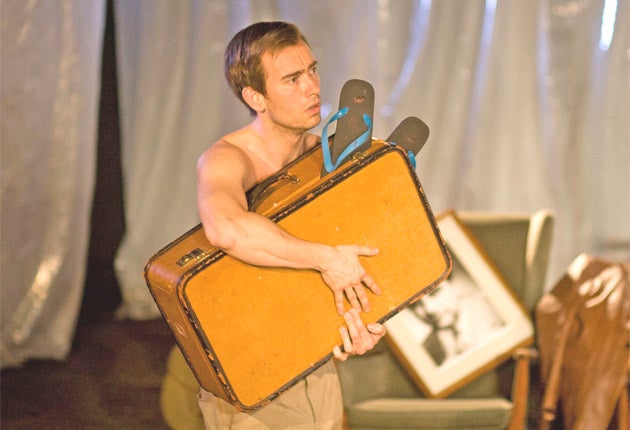The Roman Bath, Arcola Theatre, London

Your support helps us to tell the story
From reproductive rights to climate change to Big Tech, The Independent is on the ground when the story is developing. Whether it's investigating the financials of Elon Musk's pro-Trump PAC or producing our latest documentary, 'The A Word', which shines a light on the American women fighting for reproductive rights, we know how important it is to parse out the facts from the messaging.
At such a critical moment in US history, we need reporters on the ground. Your donation allows us to keep sending journalists to speak to both sides of the story.
The Independent is trusted by Americans across the entire political spectrum. And unlike many other quality news outlets, we choose not to lock Americans out of our reporting and analysis with paywalls. We believe quality journalism should be available to everyone, paid for by those who can afford it.
Your support makes all the difference.What happens if your home becomes an archaeological treasure trove? Does it belong to you or the country? Do you welcome the intrusion, and cash in; or do you dig in and resist the march of progress?
This is the dilemma facing Ivan Antonov, a Kafkaesque office-worker in Stanislav Stratiev's piquant Bulgarian farce, when he returns from an unsuccessful holiday to find his family apartment in Sofia buzzing with a television crew and assorted interested parties.
Stratiev, who died in 2000, was a leading journalist and theatre director whose first play, The Roman Bath (1974), established him as the Vaclav Havel of Bulgarian theatre: he presents a picture of an Everyman swamped by bureaucratic interference in a pre-glasnost Communist culture of austerity, obedience and corruption.
His paranoid relationship with society is established in Russell Bolam's production the minute we see him making out with a taxi-calling column under the suspicious eyes of a party apparatchik: those inconvenient steel girders in the converted carpet factory have come into their own at last.
Ifan Meredith perhaps makes Ivan too comically ridiculous from the start, but he's certainly someone to whom things happen, a born fall guy. He is treated as a trespasser on his own property: the excavations have revealed a small Roman bath decorated with tiles of romping Latin matrons in the buff.
An overweening academic (Bo Poraj) asserts rights of ownership in the cause of scholarship, but Ivan exacts revenge by pursuing his girlfriend (Rhona Croker), who resents being upstaged by a tiny swimming pool, mosaics or no mosaics. Ivan, in turn, is accused of demoting the public interest beneath his own personal convenience.
Only an Eastern European writer would develop a farce of physical displacement as a metaphor of state intervention, and Justin Butcher's text wittily ticks off all the pressure points as cultural claims are challenged by the forces of pragmatic exploitation.
The apartment where Ivan was born, first acquired by his war-veteran grandfather, becomes a playground of socialist capitalism, with a zany lifeguard (Lloyd Woolf) pleading the pool shortage to justify the instruction of the country's future Olympic swimmers in the bath, and an asset-stripping developer (Wendy Wason) claiming the property as endemic to town planning.
The fact that Ivan lives here, and can't take a bath in his own bath, is irrelevant. His responsibilities as a citizen merge with notions of cultural heritage, and a green-suited, slimy Jonathan Rhodes is soon dangling the Western European carrot of big bucks and a trip to Lake Como.
So many ideas are set off that the format begins to buckle like a stressed party wall, and the open spaces of the Arcola, though evocatively strewn with rubble and plastic sheeting in Jean Chan's design, prove inimical to the physical explosions of the actors. But it's a refreshing show, offering a glimpse of how Ray Cooney might have written if he'd ever been really persecuted, apart from suffering the odd bad review.
To 15 May (Arcolatheatre.com)
Join our commenting forum
Join thought-provoking conversations, follow other Independent readers and see their replies
Comments